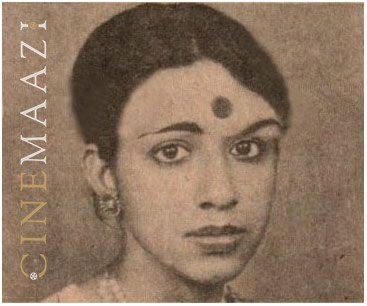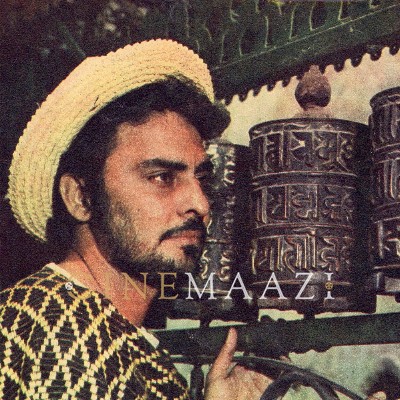Kavita Krishnamurti

Subscribe to read full article
This section is for paid subscribers only. Our subscription is only $37/- for one full year.
You get unlimited access to all paid section and features on the website with this subscription.
Not ready for a full subscription?
You can access this article for $2 , and have it saved to your account for one year.
- Real Name: Sharada Krishnamurti
- Born: 25 January, 1958 (New Delhi)
- Primary Cinema: Hindi
- Parents: T.S. Krishnamurti
- Spouse: Dr L. Subramaniam
Bestowed with India's fourth-highest civilian honour, the Padma Shri, as well as a clutch of Film Awards for Best Female Playback Singer for Pyaar hua chupke se (1942: A Love Story, 1994), Mera piya ghar aaya (Yaraana, 1995), Aaj main upar (Khamoshi: The Musical, 1996) and Dola re dola (Devdas, 2002), as well as the Maharashtra State Film Award for Best Female Playback Singer for the songs in the film Sawai Hawaldar (1999), Kavita Krishnamurthy is one of Hindi cinema’s well-known playback singers. Trained in classical music, she recorded her first song for the film Kadambari (1976), under Vilayat Khan. She went on to become one of the leading playback singers in the 90s, renowned for her renditions in 1942: A Love Story (1994), Agni Sakshi (1996), Bhairavi (1996), Khamoshi: The Musical (1996), Hum Dil De Chuke Sanam (1999), and Devdas (2002). Singing across multiple languages such as Hindi, Marathi, Kannada, Telugu, English, Urdu, Odia, Bengali, Tamil, Konkani, Malayalam, Gujarati, Nepali, Assamese, and Bhojpuri, she has rendered approximately 25,000 songs in the course of her illustrious career. Besides playback for films, she has collaborated with Western artists from various musical fields such as classical, jazz, and pop, and has performed at prestigious venues around the world. She was also awarded a Doctorate for her contribution to Indian music by Jain University in 2015.
Born Sharada Krishnamurti on January 25, 1958 in New Delhi, her gift for singing became apparent from a young age, when, aged 8, she won a gold medal in a music competition. Encouraged by her aunt, Protimma Bhattacharya, she enrolled under Suruma Basu, learning Rabindra Sangeet. Beginning her formal training in Hindustani classical music under Balram Puri, she went on to bag multiple medals in the Inter-Ministry Classical Competition in New Delhi.
Daughter of T.S. Krishnamurti, an employee in the Education Ministry, she nursed early dreams of working in the Indian Foreign Services. However, she moved to Bombay, to pursue opportunities in playback singing in the Hindi film industry. Enrolled at St. Xavier College, Bombay, she bagged the chance to sing in the Bengali film Shriman Prithviraj (1971) scored by Hemant Kumar, which had playback by the legendary Lata Mangeshkar. She also became a member of Hemant Kumar’s live performance troupe. While Manna Dey assigned her advertising jingles, she was also introduced to music directors Laxmikant-Pyarelal fame, and would go on to collaborate on many hits. Kavita got her first break singing Aayega aanewala for Kadambari (1976), which was a remake of the timeless song from Mahal (1949) originally rendered by Lata Mangeshkar.
After singing her first Kannada song Ondanondu kaaladaga, a hit number, in the film Ondanondu Kaladalli (1978), Kavita went on to sing in many more Kannada films. Her career in Hindi films took flight with her rendition of the song Tumse milkar na jaane kyon from the Hindi film Pyaar Jhukta Nahin (1985). This was followed by hit numbers Hawa Hawaii and Karte hain hum pyaar Mr. India se, from Mr. India (1986).
The 90s saw Kavita Krishnamurthi come into her own with popular songs in commercially and critically acclaimed films such as 1942: A Love Story, Yaraana, Agni Sakshi, Bhairavi, and Khamoshi: The Musical. She worked with leading music directors including R D Burman, Bappi Lahiri, Anand-Milind, A. R. Rahman, Rajesh Roshan, Ismail Darbar, Aadesh Shrivastava, Nadeem-Shravan, Jatin Lalit, Viju Shah, Anu Malik, and Himesh Reshammiya, with her collaborations with A R Rahman and Ismail Darbar producing some of her best work. While she sang duets with senior singers at the start of her career, she largely worked with popular singers of the 90s such as Amit Kumar, Mohammad Aziz, Udit Narayan, Kumar Sanu, and Abhijeet Bhattacharya, followed by Sonu Nigam, Shaan, and Babul Supriyo in the 2000s. Along with Alka Yagnik, Krishnamurthy was the most popular voice for leading ladies at the time. Some of the notable Tamil films she sang for are Neti Siddharhta (1990), Rangeela (1995), Mudhalvan (1999), and Rhythm (2000).
Exploring other forms of music in the new millennium, she was part of Warner Bros. Records’ Global Fusion album which was a collaboration of musicians from five continents. She performed in fusion music concerts across the world at prestigious venues such as Royal Albert Hall in London, The Kennedy Center in Washington, D.C., Madison Square Garden, The Lincoln Center in New York City, the Zhongshan Music Hall in Beijing, The Esplanade in Singapore, The Putra Jaya World Trade Centre in Kuala Lumpur, and Gewandhaus Leipzig. She performed as a soloist with orchestras, and also rendered songs for pop and devotional albums such as Bhalobasi, Together Tagore, Bhajan Stuti, and Venkatesha Suprabhatam. Appearing on television as a guest judge on music reality shows such as Bharat Ki Shaan: Singing Star (Season 1), Vijay TV Airtel Super Singer, Colors Bangla Great Music Gurukul, and Rising Star (Season 2), she has also sung for serials such as Alif Laila, Mahabharat, Ramayan, and Shri Krishna.
Married to noted Indian violinist, composer and conductor, Dr L. Subramaniam in Bengaluru, Karnataka on 11 November 1999, Kavita Krishnamurti resides in Bengaluru. The couple opened the Subramaniam Academy of Performing Arts in Bengaluru, while Krishnamurthy also launched her own app in 2013.









.jpg)



